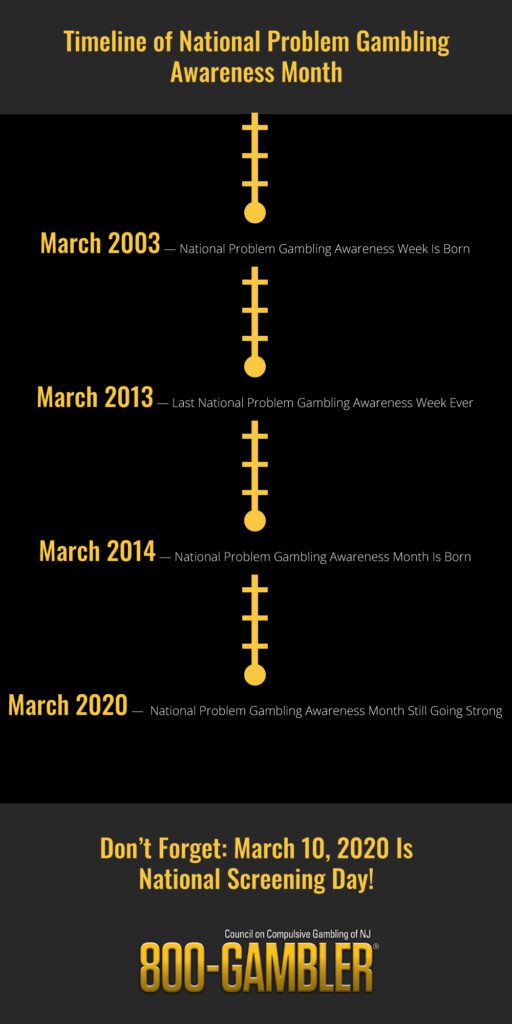What Is National Problem Gambling Awareness Month?
National Problem Gambling Awareness Month is a grassroots public awareness campaign that seeks to inform both healthcare professionals and the general public about the risks and warning signs of problem gambling. The month-long campaign is held annually during the NCAA March Madness tournaments by design — in 2019, the National Problem Gambling Helpline received more calls for help in March than any other month. Organizations such as the the National Council on Problem Gambling and the Council on Compulsive Gambling of New Jersey dedicate the entire month of March to educating the public about resources that are available to people who need help for problem gambling in Atlantic City and all other communities throughout New Jersey.
History of National Problem Gambling Awareness Month
Now that you know what National Problem Gambling Awareness Month is all about, let’s dive a bit deeper and examine the history of this grassroots campaign.

It All Started in 2003 as Problem Gambling Awareness Week
In 2003, the National Council on Problem Gambling (NCPG) announced the first annual installment of National Problem Gambling Awareness Week. The campaign was held March 10 – 17 and far exceeded expectations. NCPG reported distributing more than 1,500 packets of specialized materials, in addition to holding events in 25 states during the week. A total of 52 organizations rallied behind NCPG to support the campaign events, which received an overall positive evaluation from 80% of participants, according to NCPG reports.
National Problem Gambling Awareness Week had 11 successful runs before it came to an end in 2014 — but in reality, that was just the beginning. The beginning of National Problem Gambling Awareness Month.
In 2014, National Problem Gambling Awareness Month Was Born
The NCPG kicked off National Problem Gambling Awareness Month (NPGAM) in 2014, stating in their campaign discussion guide that the purpose of the event was to “encourage healthcare providers to screen their clients for gambling problems and to raise public awareness of problem gambling issues.” To this day, that has remained the mission of NPGAM, a campaign that the Council on Compulsive Gambling of New Jersey proudly supports and participates in.
National Problem Gambling Awareness Month 2020: What to Expect
We expect great things from the nationwide campaign in 2020, as we generate awareness about our 800-GAMBLER helpline in addition to other resources we offer to people who need help with problem gambling. Tuesday, March 10, 2020, is Gambling Disorder Screening Day, a day that healthcare providers around the nation dedicate to hosting screening events where individuals can go to find out if they have a gambling problem. Expect to see a lot of social media buzz around Screening Day, as well as the entire month-long campaign in general — NCPG is running a “31 days of social media posts” campaign on social media, which you can check out here.
Why Is Problem Gambling Awareness Month Important?
Keith Whyte, executive director of the National Council on Problem Gambling, has stated the following about the purpose and importance of National Problem Gambling Awareness Month:
“March Madness is a time when we see an increase in gambling and more outreach for our services. PGAM is important to me – and NCPG as a whole – because we want to help individuals with problem gambling, and this is the peak time for raising awareness of the issue.”
We couldn’t agree more with Mr. Whyte, who is one of the leaders of a meaningful cause that the Council on Compulsive Gambling of New Jersey has been fighting for, as well.
Test Your Knowledge — PGAM Edition
Take this quiz to test your knowledge about National Problem Gambling Awareness Month:
If you know someone who needs help for problem gambling in Monmouth, NJ, or elsewhere in the Garden State, call our 24-hour confidential helpline at 800-GAMBLER for support, treatment, and hope — the help you need is available.
Sources:
http://www.ncpgambling.org/files/public/NCPG_2003_Annual_Report.pdf
http://www.ncpgambling.org/files/NPGAM/NPGAM%20Weekly%20Discussion%20Guide.pdf



